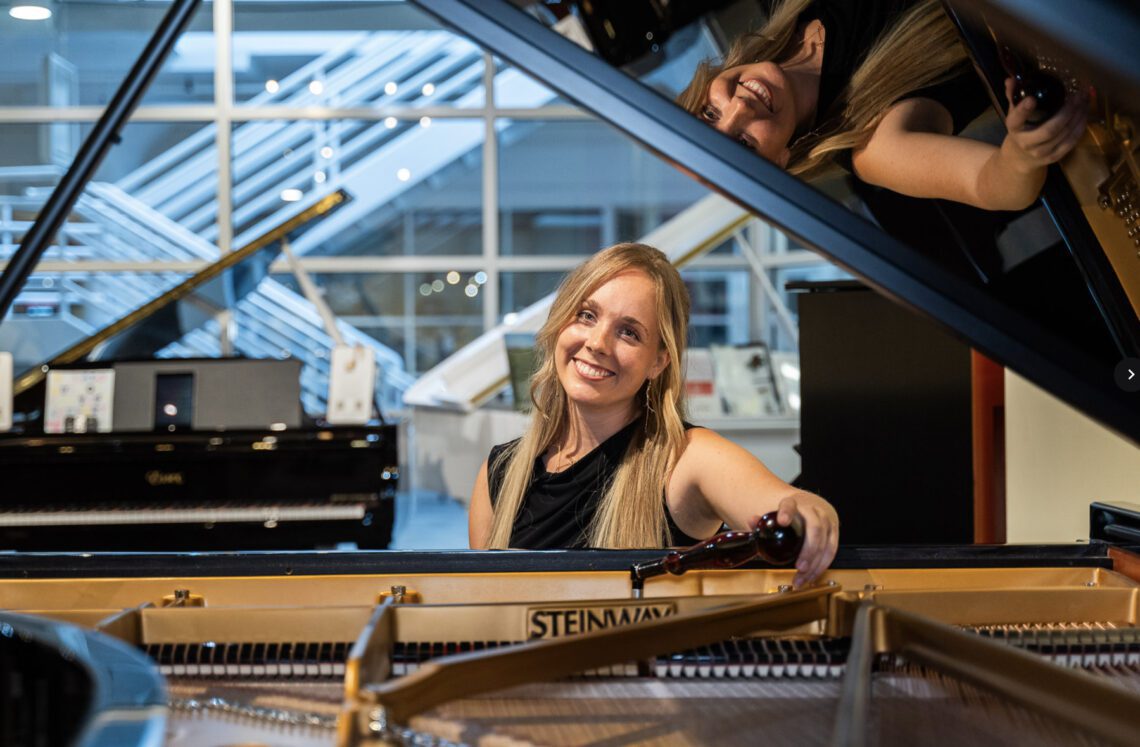Madelin’s Piano Services focuses on craft of fine-tuned pianos
By Taylor Owens CONTENT MARKETING LEAD
Special advertisement
When you hear the rich tones of a well-tuned piano, you’re hearing more than notes—you’re hearing the care of a skilled technician. For Madelin Woodrum, a traveling piano technician, this care is not just a service; it’s a life’s passion.
“I’m very passionate about pianos and that they’re well taken care of,” Woodrum said. “I’m not trying to sell services to get a paycheck—I really love these instruments and want to see them last a long time.”
Woodrum brings a passion for quality craftsmanship and client satisfaction to her work. A graduate of North Bennet Street School, a private vocational school in Boston, she has trained in both basic and advanced piano technology and gained hands-on experience interning at Steinway & Sons. Based in Vancouver, Washington, she serves regions from Hawaii to Big Sky.
Woodrum’s path to this niche profession began in high school when her parents bought an upright piano.
“This guy, Mike Toya, came and tuned it, and my mind was just blown that you could do this as a job,” she said.
Toya, whose son attended North Bennet Street School as well, introduced her to the world of piano repair and inspired her to pursue it as a career. She learned tuning, in-home repairs, and full piano restoration, including soundboard replacements and restringing.
“I also worked at Steinway in New York as an intern for their Spirio player pianos,” she said. “So I’ve worked in their factory and main showroom near Times Square, which was an amazing experience.”
Today, Woodrum travels around the U.S., servicing pianos in homes, concert venues and community spaces. In Montana, she has particularly close ties to the Big Sky community.
“I got my foot in the door in Big Sky with a Steinway warranty call,” she said. “Now I come out twice a year, hoping to expand my business here.”
Woodrum’s services cover a range of needs, from basic annual tuning to complex restorations. During appointments, Woodrum evaluates each piano to determine what it needs most.


“The process is different for every piano,” she said. “I always start with tuning to see the piano’s overall condition, then focus on what’s most needed. Sometimes it’s voicing to adjust the tone, sometimes regulation if it’s hard to play, or fixing any broken parts.”
One of the aspects of her job that excites her most is restoring pianos with special histories. Recently, she’s been restoring a 1923 Steinway that belonged to a beloved music teacher in Hawaii.
“It’s barely holding together, with rusted strings and broken parts, but I’m honored to bring it back to life,” she said. “As I travel around, people recognize this piano—it has a legacy here, and it’s amazing to be part of its story.”
She’s also working on a piano once owned by Doris Duke, the American heiress and socialite known for her glamorous parties.
“This piano likely had famous guests play on it, and the ivory keys are worn into little cups from all the years of playing,” she said.
Whether restoring pianos with rich histories or tuning those in local homes, Woodrum sees every piano as a part of its owner’s life and memories. Her dedication extends beyond the tools of the trade.
“People often don’t realize how gradual the change in a piano’s sound and feel can be,” she said. “They’ll think it just doesn’t play well anymore, but after a tune-up, they say, ‘Oh my gosh, I love my piano again.’ It’s like a car that needs regular service to keep running smoothly.”
For piano owners, she recommends tuning once a year to keep the instrument in balance, especially in climates like Montana’s.
“If you keep up with maintenance tuning, it holds better over time,” she said. “If you let it drift out of tune for too long, it can become unstable.”
This regular upkeep preserves the piano’s sound and longevity.
“Even if people don’t play often, tuning is important for the piano’s overall health,” she said.
For Woodrum, each piano is more than an instrument—it’s a living entity with stories and sentimental value.
“I think of pianos as beautiful instruments,” she said. “It’s super sad when a piano hasn’t been maintained and doesn’t have much life left. When I say a piano should be tuned or regulated, it’s not just to make it sound better—it’s for the life of the piano.”
Learn more about Madelin Woodrum and her work.











